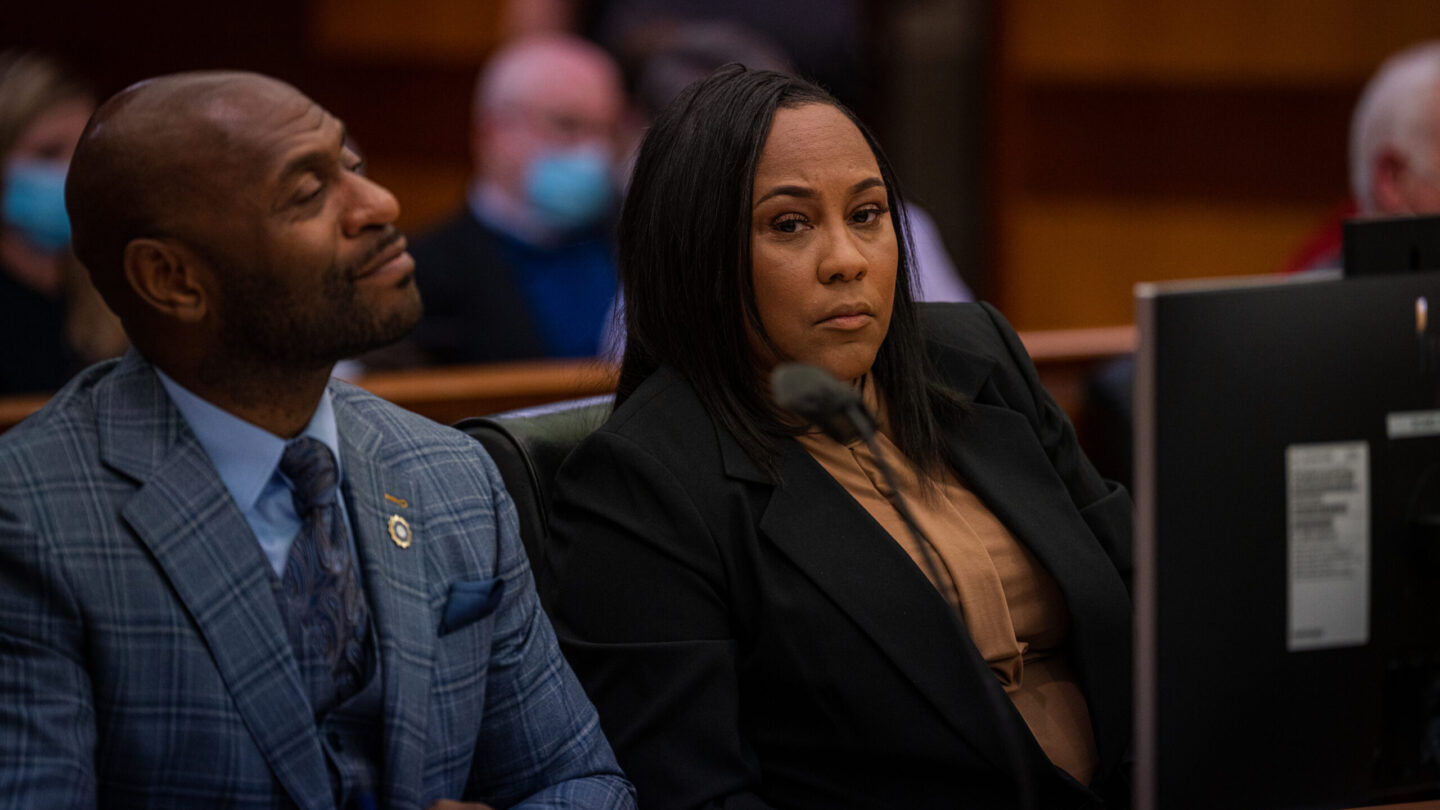Fulton DA Fani Willis acknowledges relationship, calls misconduct claims 'meritless'

In a new filing, Fulton County District Attorney Fani Willis acknowledged a relationship with Special Prosecutor Nathan Wade but called motions to disqualify her “meritless.” (Matthew Pearson/WABE)
Updated: 4:52 p.m.
In a 176-page filing, Fulton County District Attorney Fani Willis acknowledged a personal relationship with Special Prosecutor Nathan Wade. Still, she argued that motions to disqualify her from the Georgia election interference case are “meritless” and should be dismissed “without further spectacle.”
The response filed in the court docket on Friday came nearly a month after defendant Michael Roman alleged an improper relationship between Willis and Wade. Roman, who worked on then-President Donald Trump’s 2020 campaign, argued that the relationship created a conflict of interest that should render his indictment moot and called on the judge to disqualify Willis and her team from prosecuting him.
“The legal basis for each of these motions to disqualify the District Attorney falls woefully short of that which would meet the applicable standards, and in light of the record evidence, no further factual development is necessary to deny the motions in their entirety,” prosecutors wrote in the Friday filing.
Roman accused Wade of being unqualified for the job, and Willis of indirectly benefiting from compensation Wade received for working the case. Trump and co-defendant Robert Cheeley later joined Roman’s motion to disqualify Willis and dismiss the charges against them.
Roman is facing seven felony charges in connection with his role in organizing slates of Trump electors despite now-President Joe Biden’s victory in 2020.
In Friday’s response, which included a sworn affidavit from Wade acknowledging the relationship, prosecutors wrote that Willis and Wade did not begin a personal relationship until 2022, after Willis hired Wade to join the election interference case.
Prosecutors argued that the relationship presented no personal or financial conflicts of interest and upbraided defense counsel for attempting “to cobble together entirely unremarkable circumstances of Special Prosecutor Wade’s appointment with completely irrelevant allegations about his personal family life into a manufactured conflict of interest on the part of the District Attorney.”
They also forcefully defended Wade’s qualifications for the role, characterizing the accusations as “bad faith” and attaching Facebook posts from Roman’s attorney, Ashleigh Merchant, enthusiastically supporting Wade’s campaign for a judgeship in 2016.
Prosecutors also wrote that Willis and Wade never shared any joint accounts or household, never merged daily expenses and were both financially independent and split expenses on trips they took.
“To be absolutely clear, the personal relationship between Special Prosecutor Wade and District Attorney Willis has never involved direct or indirect financial benefit to District Attorney Willis,” prosecutors wrote.
Fulton Superior Judge Scott McAfee has scheduled a hearing on Feb. 15 to weigh the motions to disqualify Willis, but Willis argued they should be tossed outright without a hearing. Willis and Wade have both been summoned to testify, according to copies of subpoenas included in the state’s Friday filing.
“The chances of a successful disqualification went from 5% to .05%,” Georgia State University Law Prof. Anthony Michael Kreis wrote on X after the response became public.
Atlanta-area defense attorney Andrew Fleischman wrote on X that “if it’s important enough for Fani Willis” to distinguish that the personal relationship began before Wade was hired, “it’s important enough to have a hearing to decide if it’s true.”
Roman’s attorney swiftly countered Willis’ response in a late Friday filing, calling on the court to stick to the evidentiary hearing scheduled for later this month.
“If they had nothing to hide in the first place because they did nothing wrong, then why did they intentionally not tell anyone about it until they got caught with their hand in the cookie jar?” Merchant wrote. “This highlights the very reason why this Court cannot just take their word for it.”
Even if the defendants’ motions are ultimately dismissed, as many legal observers expect, appeals could still delay or derail the case. A trial date has yet to be set. Legal experts say the claims have already distracted from the facts of the case and could erode the public’s trust in the investigation.
Willis did not directly respond to the allegations for weeks, though, in an effort to quash a subpoena to testify in Wade’s ongoing divorce, she wrote in a filing in that case that the claims were designed to interfere with her investigation into Trump.
Wade and his estranged wife reached a temporary agreement Tuesday ahead of a hearing where Wade may have faced questions about the alleged relationship. A judge unsealed filings in the divorce case in January, including a motion with an attached credit card statement showing plane tickets Wade booked to travel with Willis to San Francisco and Miami.
Willis seemed to acknowledge the controversy in a January speech at Big Bethel AME Church, telling the congregation she is facing undue scrutiny as a Black woman.
“God, you forgot to mention that my life and the life of my family would be threatened so regularly; I now think it’s not normal if I don’t have two death threats in a week,” Willis said. “You did not tell me it would not matter what I did, my motive, talent and ability would be constantly attacked.”
Trump’s Georgia lawyer, Steve Sadow, wrote in his motion to disqualify Willis that she wrongfully inserted “racial animus into this case to publicly denounce and rebuke the defendants.”
“District Attorney Willis’ public comments are well within all legal and ethical rules and guidelines, and provide no basis for disqualification or dismissal of the indictment,” prosecutors wrote in response. “Defendant Trump’s motion raising public comments made by District Attorney Willis that neither reference this case nor these defendants as a basis for disqualification is transparently meritless.”
Willis’ Friday response included exhibits illustrating the racist, sexist and threatening letters and messages she has received since beginning her investigation into Trump – and called Sadow’s claims “transparently meritless.”
“Nothing has changed,” Sadow wrote in a statement on Friday. “Our requested remedy remains clear: dismiss the case and disqualify the DA, together with her team and office, from any related matters.”
Republican lawmakers have also ramped up their own efforts to investigate Willis. In Washington, D.C., on Friday, the Republican-controlled House Judiciary Committee subpoenaed Willis for documents and information related to a whistleblower lawsuit over her office’s use of federal grant funding.
Georgia Senate Republicans created an investigative committee with subpoena power they say will scrutinize Willis, and GOP state lawmakers are also working to implement a new Prosecuting Attorneys’ Qualifications Commission with the power to discipline or remove elected prosecutors.
This is a developing story.








